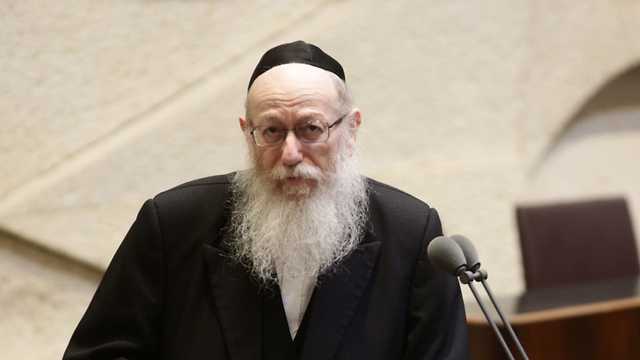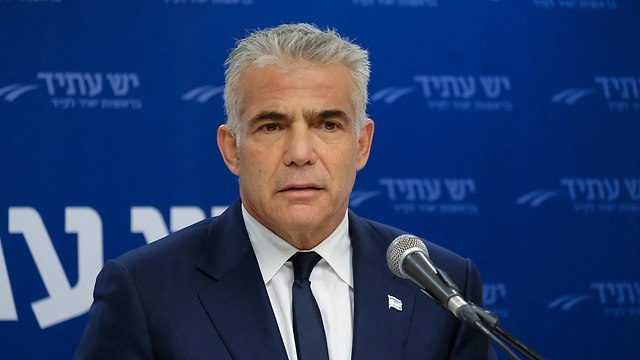
Deputy Health Minister Yaakov Litzman threatened Monday evening to quit the coalition if the IDF draft bill proposal is passed into law.
"No one thinks or dreams that if (MK Yair) Lapid supports this bill, that we will support it too," Litzman, who leads the Hasidic Agudat Yisrael faction in United Torah Judaism, said at the Knesset.
"We need to get to a situation in which anyone who wants to study at a yeshiva can have an arrangement that allows him to continue studying uninterrupted, and that is why we will vote against the law," he explained.
The existing Israeli Defense Service Law expires in September after the High Court of Justice deemed it unconstitutional, and so the Knesset must pass an alternative law before then.
If a new law is not passed to regulate the exemptions of ultra-Orthodox yeshiva students, tens of thousands of them are expected to receive IDF draft orders.
The proposed legislation includes planned cuts to the yeshivot's budgets and the use of economic incentives to pressure the Torah study institutions to encourage enlistment, but no criminal sanctions.
The enlistment objectives, as stated in the proposal, are that 3,000 yeshiva students will be drafted in the first stage and 600 will volunteer for national service. The plan will be given a two-year adaptation period, in which sanctions won’t be imposed if the yeshivot fail to meet the draft rates. In the third year, yeshivot who fail to encourage enlistment will be hit with economic sanctions if they drop below a 95-percent target.
Prime Minister Benjamin Netanyahu, who seeks to pass the legislation in its first reading on Monday, described the proposed legislation as "a good and balanced law."
Speaking at a Likud party meeting, the prime minister said his government is "busy not with making headlines, but with getting results."
"The intention here is to handle the inequality in carrying the burden of service," he said.
"The first burden is a massive economic burden. The overall defense budget—not just that of the IDF, but also the Mossad and the Shin Bet and other defense expenses—is about $20 billion. It's about a third of Russia's budget. Meaning, Israel has a massive budgetary burden and only a small part of it, a little over 10 percent, comes from the US," Netanyahu explained.
Returning to the legislation, the prime minister said the integration of more ultra-Orthodox men in the IDF should be done "with understanding, by talking, and not by forcing it."
"That is why we have a balanced and good law. On the one hand, we are promoting (Haredi) integration into the job market, and on the other hand there's this law to encourage an increase in the Haredi public's participation in military service, based on the army's needs," he went on to say.
Netanyahu added he would've liked "to pass this law as soon as possible, to resolve this problem and set the path for the coming years."
Opposition torn over bill
The IDF draft bill, which was approved by the government on Sunday, will go up for its first reading vote in the Knesset on Monday.
Netanyahu's Likud party, as well as coalition partners Yisrael Beytenu, Bayit Yehudi and Kulanu, all plan to vote in favor of the legislation. The Haredi parties are expected to vote against the bill, which could lead to the Haredi ministers' dismissal and the collapse of the government.
In the opposition, opinions are split. MK Yair Lapid's Yesh Atid party is expected to vote in favor of the legislation, while Zionist Union and Meretz will vote against it and the Joint List's MKs will be absent from the vote.
Earlier Monday, Zionist Union leader Avi Gabbay accused Lapid of of betraying IDF soldiers over his support of the legislation.
“This is what surrender looks like, this is what betrayal against our soldiers looks like, and this is what a party that has crossed over to the other side looks like,” Gabbay said at the start of the weekly Zionist Union faction meeting.
“Today," Gabbay continued, "we will see Yesh Atid’s surrender at the Knesset after it panicked over public opinion polls and stopped believing that our camp can win. It chose to cross over to the other side, to give up our values and opinions.
“It’s a party that says that if you can’t win them—join them. A party takes votes from our camp, which seeks to change the government, and simply hands them out to Netanyahu and (Defense Minister Avigdor) Lieberman. I’m genuinely asking, what happened? You lost a few seats in the polls, so you went upside down? Betraying the voters and the entire public," he added.
Lapid responded to Gabbay’s accusations during Yesh Atid’s faction meeting, saying that the Zionist Union was embarrassing itself.
“This is basically a Yesh Atid law from the previous Knesset, but this time it has been signed both by the IDF and the chief of staff. That’s what we will vote for, for the value of IDF enlistment,” he said
“Yesh Atid won’t play politics when it comes to such an important issue. I understand that our friends in the opposition decided to turn the vote into a motion of no confidence in order to embarrass us. They’re not embarrassing us. They’re only embarrassing themselves.
“I’m not voting for the government,” Lapid clarified. “It’s a bad government that has to go. But I do vote for good and appropriate laws, because that’s my job as a Knesset member and as someone leading an alternative in the State of Israel.”
Justice Minister Ayelet Shaked slammed Lapid's claims that the current bill is almost identical to the one he drafted with her in the previous term as an "utter lie."
“The statement that the new bill is his is an utter lie. I’ve never come across a politician who lies so brazenly,” she raged.
“This lie has a goal, the journalists and politicians. Everyone was aware of the argument I had with MK Lapid and Ofer Shelah during the previous government. I begged to only include the economic sanctions in the amendment since I thought it would be the right thing and they’d refused,” Shaked continued.
"In this bill, the power is at the hands of the defense minister, as opposed to Lapid’s stance in the previous bill and so I’m surprised that he doesn’t have the courage to say ‘I’ve changed my mind. The insistence on mandatory draft was unnecessary,” she exclaimed.




















